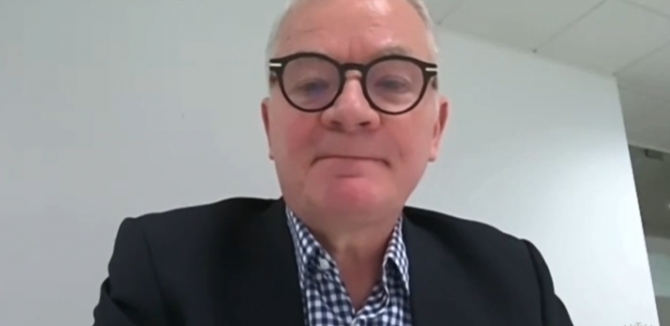Studies cited by the government to support its proposals to extend the school day need “optimal conditions” or schools risk “making things worse”, says the chief executive of the Chartered College of Teaching.
The Department for Education’s exploration of how extra time in school could benefit students will be included in the long-awaited education recovery plan, expected next month.
It forms one of education recovery commissioner Sir Kevan Collins’ three Ts – tutoring, teaching and time – which he says are crucial to help children catch up.
A DfE document sent to stakeholders this month, seen by Schools Week, cites ten studies to show how extra time and support can help schoolchildren to recover.
A 2019 study by the Education Endowment Foundation (EEF), published as part of its toolkit, includes international evidence on teaching 5 to 16-year-olds.

The DfE said the EEF “estimates that pupils can make two months additional progress per year from extended school time, particularly through the targeted use of before and after school programmes.
“There is also some evidence that disadvantaged pupils make closer to three months additional progress.”
Parent and staff support needed
But the department did not mention the study’s suggestion that any increases in school time “should be supported by both parents and staff”. It concluded the policy as “low impact for moderate cost, based on moderate evidence”.
This week a YouGov survey, carried out for The Times found that 60 per cent of almost 3,000 parents were opposed to extending school hours.
The EEF research also acknowledged that attracting and retaining pupils for before and after-school programmes was an issue, especially for secondary schools.
The DfE also cited a 2012 study by Victor Lavy, which concluded that evidence from a sample of 15-year-old pupils from more than 50 countries consistently showed that “additional instructional time has a positive and significant effect on test scores”.
The study suggested that the first two hours of teaching had the “highest effect”. After that the impact on results began to drop, but only in small amounts.
PISA evidence in 2018 showed that a “positive association” with learning time in regular English lessons and reading performance weakened when students spent more than three hours a week in those lessons. UK students already spend more than four hours a week in English lessons.
It also found that on average across OECD countries students in schools that offered additional lessons did not score better or worse in reading than students who did not have them.
Evidence is ‘more nuanced’

Alison Peacock, the chief executive of the Chartered College of Teaching, said the evidence was “more nuanced” and was “based on every school needing to have optimal conditions”.
“So the idea of having less than that, if we are trying to improve academic learning, feels risky at best. If we get this wrong and it’s taken out of the hands of schools, we risk making things worse.”
Most of the evaluations on extending school time come from the US, the EEF said in its research, where the school year is shorter by about two weeks. Evidence from the UK is “relatively scarce”, they add.
OECD research from 2014 shows that children in England already have more hours of teaching at primary and lower secondary – 7,904 – compared to the average in organisation countries of 7,475.
The DfE also cited its own 2017 research showing “countries identified as having high-performing technical education systems are characterised by relatively high number of teaching hours – on average this is equivalent to 1,000 hours a year”.
But the report’s introduction said it was not an evaluative assessment and looked only at vocational education.
‘Decision must be made soon on school day’
Collins has previously said that extra time in schools could be used for play and other activities, not just academic work, and has suggested it should be compulsory.
Plans on how extra time in the school day could look are still being bashed out, with The Sunday Times reporting earlier this month that the Treasury was at loggerheads with Boris Johnson over funding. Collins has said £15 billion is needed.
But Peacock says a “decision must be made” as the sector has been hearing “endless rumours” about the plans, with a “constant slow drip of information”.
An EEF spokesperson said the research suggested that lengthening the school day could be “effective at accelerating pupil outcomes in some settings”.
But they added that success was dependent on “crucial factors”. If it were to be part of education recovery, supportive measures needed to be in place “so that it is impactful and does not present further challenges for teachers”.
A DfE spokesperson said it would share further details on the education recovery plan in “due course”.








In 2013, Gove told the Spectator 2013 Conference that English pupils had to have longer school days and shorter holidays in order to keep up with children in the Far East. But English pupils were already spending more hours in classrooms than the OECD average.
In 2011, OECD issued a paper in its PISA in Focus series(No 3) which discussed whether increasing after-school classes pay off. It concluded that time spent in regular classes was more important than extra lessons. The latter could increase equity but only if they were with the pupils’ regular teacher. A teacher from outside the school could worsen inequities between pupils. Surely this has implications for the present focus on tutoring as a magic bullet?.
It’s more important to ensure pupils attend school regularly for timetabled lessons. Extra-curricula activities are important, yes, but they should be seen as broadening experience not more of the same.
“The DfE also cited a study . . . That showed that “additional instructional time has a positive and significant effect on test scores”. TEST SCORES! Passing tests in subjects you spent a lot of time over.! SO WHAT!
“The study suggested that the first two hours of teaching had the “highest effect”. After that the impact on results began to drop, but only in small amounts” . Your concentration drops after a while. Did that need a study to prove?
“PISA evidence in 2018 showed that a “positive association” with learning time in regular English lessons and reading performance weakened when students spent more than three hours a week in those lessons. UK students already spend more than four hours a week in English lessons.” Huge American studies from the 90s (?) demonstrated that replacing one English lesson with one of Music made kids achieve better in English. Probably made them better at music too!
We should educating the whole child, not force-feeding the next generation of call-centre fodder.
People who advocate extension of the school day are trying to secure cheap childcare. If the suggestion was for more time for extracurricular activities, then fine. As long as it does not impact on teachers. Teachers cannot do more than what they are doing already. They need time to attempt to live lives.